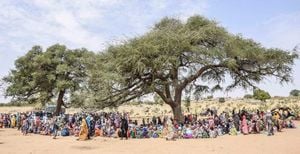North Korea's persistent quest to bolster its military prowess has been thrust back to the forefront of international discussions following its recent missile tests and statements from its leadership. Just days after test-firing an intercontinental ballistic missile (ICBM)—its first such test since the previous year—Verbatim claims from Pyongyang confirm the nation's intention to speed up its nuclear weapons program. This alarming development has prompted calls for vigilance from global powers, marking the acceleration of tensions anew on the Korean Peninsula.
On October 31, 2024, North Korea launched its latest missile, which reportedly flew for 1 hour and 26 minutes, reaching altitudes exceeding 7,000 kilometers (about 4,350 miles) before plunging safely back to sea. The missile, identified as the Hwasong-19, is characterized by its enhanced capabilities, including larger warhead capacity compared to earlier versions, and the use of solid propellant which allows for rapid deployment and greater logistical flexibility.
Khaled Khiari, UN Assistant Secretary-General for Asia, underscored the grave risk posed by these launches, noting they breach multiple Security Council resolutions aimed at curbing North Korea's ballistic missile ambitions. He went on to articulate the serious risks posed to international civil aviation and maritime activities due to North Korea's failure to issue safety alerts during such tests. These alarming indicators necessitate urgent diplomatic engagement to alleviate escalation.
Adding to these tensions, North Korean authorities described their launch as part of their military doctrine and as necessary to counter threats from hostile nuclear states, particularly aligning this sentiment against the backdrop of increased military collaboration between the U.S. and South Korea. Kim Song, the North Korean envoy to the UN, stated at the Security Council meeting, "The nuclear threat of the United States against North Korea has already reached a dangerous level," implying Pyongyang’s justification for its advancements.
Experts and analysts now speculate whether North Korea has leveraged its ties with Russia—especially amid the Ukraine conflict—for technological support. Reports suggest North Korea could be sending significant numbers of soldiers to assist Russia on the battlefield, which both U.S. and Ukrainian authorities have flagged as escalatory behavior. The presence of upwards of 8,000 North Korean soldiers stationed near the Kursk region has fueled fears of direct military involvement should they engage in combat operations.
During the October 31 missile test, North Korean leader Kim Jong Un described the action as "an appropriate military response" to perceived threats, indicating the regime's steadfast belief in the necessity of strengthening its nuclear capabilities.
Japan's response to North Korea's missile test has been particularly alarmed, with officials highlighting the missiles' significantly threatening nature due to their proximity and no safety protocols being observed. Ambassador Yamazaki Kazuyuki of Japan expressed deep concern, declaring the situation not just detrimental to regional security but also to global stability.
Similarly, South Korea has not stayed silent, urging international scrutiny and restraint of North Korea's military actions. Joonkook Hwang, South Korea's ambassador, questioned how such actions could emerge from what he characterized as "an impoverished pariah regime," reflecting frustration concerning the apparent loopholes enabling North Korea's missile advancements.
The United States has consistently condemned North Korea’s military advancements, asserting them as direct violations of UN Security Council mandates. Robert Wood, the U.S. ambassador to the UN, condemned both North Korea’s missile tests and the enabling stance of China and Russia, criticizing their actions as harmful to global peace and security.
During Security Council discussions, he emphasized the need for accountability against North Korea's clear violations of international agreements, advocating for international unity against these threats. Wood went on to clarify the U.S. commitment to ensuring the safety of its allies and deterring any potential aggression from North Korea.
Concerns about North Korea's unyielding nuclear ambitions are compounded by its diplomatic isolation, with many nations becoming increasingly wary of potential retaliatory actions stemming from heightened military provocations. While North Korea insists on its right to develop defensive measures, this rhetoric continues to aggravate regional powers and gulf countries alike.
China, often viewed as one of North Korea’s staunchest allies, has also voiced concerns about the rising tensions surrounding the Penninsula. Ambassador Fu Cong urged all parties involved to revert to dialogue and compromise to stabilize the situation, emphasizing calm over antagonistic posturing.
Interestingly, North Korea's increased diplomatic engagements with Russia and the kinetic developments of its military capabilities could reflect not merely aggressiveness but also strategic calculations to leverage these tensions for future diplomatic negotiations. Analysts suggest the regime feels cornered by sanctions and growing global isolation, seeking to garner more leverage through missile tests and potential military ebb-and-flow with Russia.
Given the historical significance of missile tests originating from North Korea, the international community must remain vigilant. Pyongyang’s ambitions are not expected to wane anytime soon, especially with its leadership framing military growth as its only viable response to perceived external threats. It appears as though the overflowing tension may require more than just diplomatic discourse—it necessitates concrete and cohesive international strategies to combat the emergent threats.
Many observers remain concerned over the negative ramifications of North Korea's military tests on broader regional stability, which raises questions about future peace processes and arms control negotiations. For the time being, the focus will likely remain on North Korea's actions as the entity continues its provocative stance against international norms.
Looking forward, the question remains: How will the global community respond to the volatile balance of power on the Korean Peninsula? Will structured international pressures yield changes, or will North Korea continue its path of asserted military escalation?



